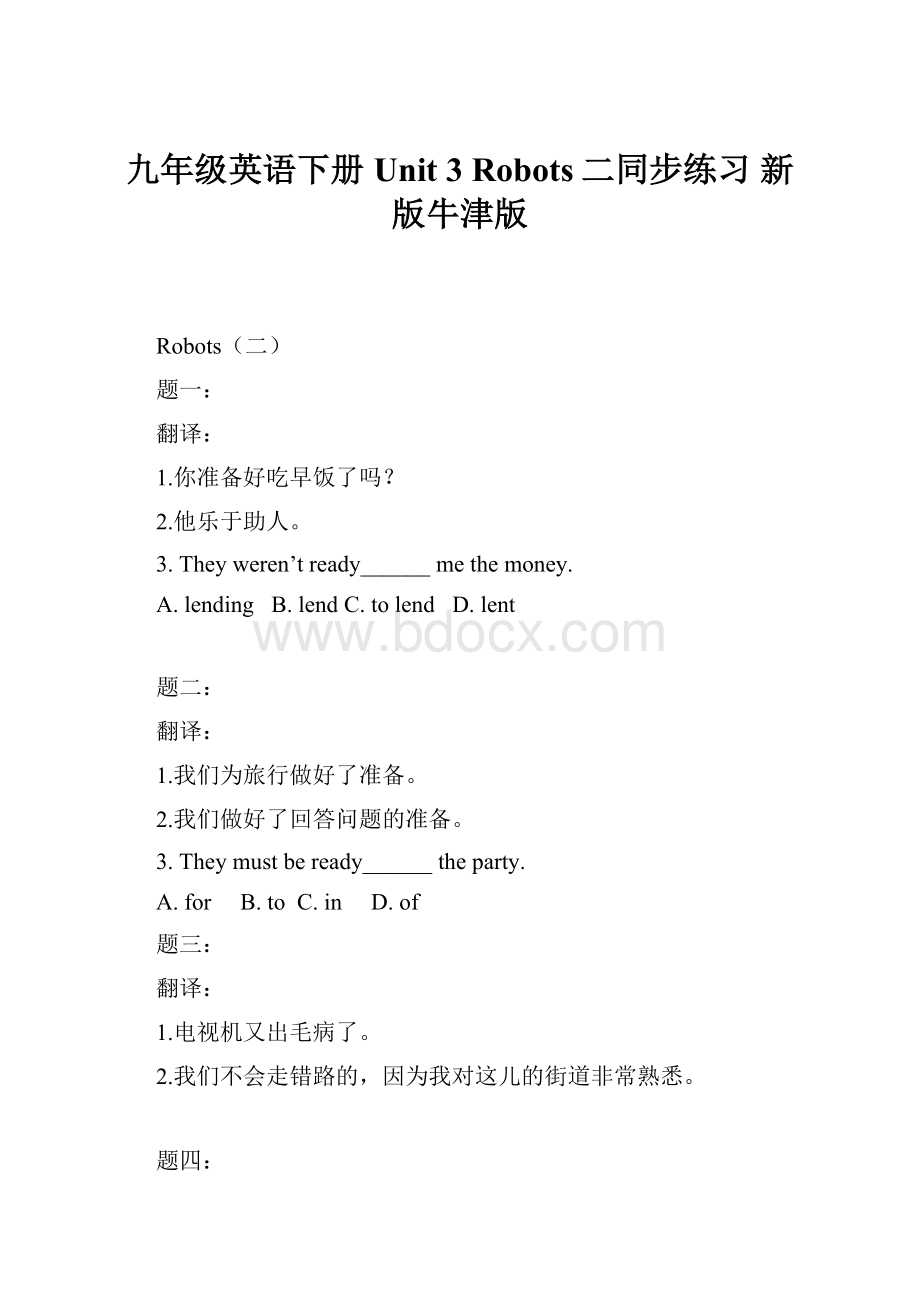九年级英语下册 Unit 3 Robots二同步练习 新版牛津版.docx
《九年级英语下册 Unit 3 Robots二同步练习 新版牛津版.docx》由会员分享,可在线阅读,更多相关《九年级英语下册 Unit 3 Robots二同步练习 新版牛津版.docx(14页珍藏版)》请在冰豆网上搜索。

九年级英语下册Unit3Robots二同步练习新版牛津版
Robots
(二)
题一:
翻译:
1.你准备好吃早饭了吗?
2.他乐于助人。
3.They weren’t ready______me the money.
A.lendingB.lendC.tolendD.lent
题二:
翻译:
1.我们为旅行做好了准备。
2.我们做好了回答问题的准备。
3.Theymustbeready______theparty.
A.forB.toC.inD.of
题三:
翻译:
1.电视机又出毛病了。
2.我们不会走错路的,因为我对这儿的街道非常熟悉。
题四:
翻译:
1.你的表肯定有毛病了。
2.全社会都要帮助走入歧途的青年。
题五:
翻译:
1.你怎样处理你的旧自行车的?
2.你想要怎么处理她?
题六:
翻译:
1.你把我的雨伞怎么了?
2.你捡到的那台照相机怎么处理了?
题七:
翻译:
1.这个电视节目中的广告太多了。
2.箱子太重了,所以我搬不动它。
题八:
翻译:
1.我们有太多的工作要做。
2.我觉得这儿太热了。
请把窗户打开。
题九:
翻译:
1.把这个空盒子拿走,给我拿个满的来。
2.拜托您捎个信儿给他。
3.他们强迫他把一切全告诉他们。
题一十:
翻译:
1.我让他带一些水果给我。
2.我想带一些花给她。
3.我妈妈不会让我去看电影的。
题一十一:
翻译:
1.我后悔自己那样的不小心。
2.她每天早上都自己整理床铺。
3.他让安娜6点叫醒他。
4.你必须向你姐姐道歉。
5.请等一下,我去看他是不是在。
题一十二:
翻译:
1.他懊悔提起那件事。
2.我将要铺床然后洗茶杯。
3.他让我在门口等。
4.他为自己的错误而道歉。
5.请等一下,我去找支钢笔来。
题一十三:
翻译:
1.你知道谁赢了这一局游戏吗?
2.他没有告诉我什么时候我们能再见面。
3.你能告诉我3号公共汽车站在哪吗?
4.我不知道为什么火车晚点了。
5.你知道他们在等谁吗?
6.---Would you please tell me ______?
--- In a small village near Ningbo.
A. where was your mother born B. where your mother was born
C. when was your mother born D. when your mother was born
7.I don’t know ______ up so early last Sunday.
A. why did he get B.why he gets
C.why does he get D. why he got
8.There is not much difference between the two. I really don’t know ______.
A. what should I choose B. which I should choose
C. which should I choose D. what I should choose
题一十四:
翻译:
1.你能告诉我她正在干什么吗?
2.你知道她什么时候来这里的吗?
3.请告诉我们明天去哪里钓鱼。
4.我想知道多久开始。
5.我不知道如何和别人相处的好。
6.---Could you tell me______?
---Sorry, I don’t know. I was not at the meeting.
A. what does he say at the meet
ing
B. what did he say at the meeting
C. what he says at the meeting D. what he said at the meeting
7.Would you please tell me ______ next, Mr. Wang?
A. what should we do B. we should do what
C. what we should do D. should we do what
8.I don’t know ______ tomorrow.Can you tell me?
A.when we started
B.when did we start
C.when we will start D.when will we start
题一十五:
DuringtheSecondWorldWar,itwasdifficulttotravelbyplane,becausetheseatswereneededforimportantgovernmentofficialsandarmyofficers.Mr.Brownworkedforthegov
ernmentduringthewarandhewasdoingverysecretwork.Nobodywasallowedtoknowhowimportanthewasexceptveryfewpeople.OnedayhehadtoflytoLondontogiveatalktoafewtoppeoplethere,butanimportant
armyofficercametotheairportatthelastminute.Mr.Brown’sseatwasgiventohim,sohewasnotabletoflytothecitytogivehistalk.Itwasnotuntilhereach
edthecitythattheimportantofficerdiscoveredthatthemanwhoseseathehadtakenwastheonewhosetalkhehadflowntohear.
1.Mr.Brownwas___________.
A.anarmyofficerB.asecretworkerC.anordinaryofficialD.apublicspeaker
2.Planeticketswerehardtogetfor_________.
A.ordinarypeopleB.governmentofficialsC.armyofficersD.secretworkers
3.Mr.BrownhadtoflytoLondonbecause_________.
A.hewouldgiveatalktothesoldiers
B.hewouldmeetanimportantarmyofficer
C.hewouldgiveatalktosomeimportantpeople
D.hewouldspendhisholidaythere
4.Mr.Browncouldnottaketheplane,because_________.
A.hissecretworkwasdiscovered.
B.hewantedtochangeforanotherplane.
C.hisseatwasgiventoanimportantarmyofficer.
D.hewasunabletogobyair.
5.Whatdidthearmyofficerdiscoverintheend?
________.
A.Hehadtakenaveryimportantperson’sseat.B.Mr.Brown’stalkwasimportant
C.Mr.Browndidn’tdoimportantsecretworkD.Mr.Bro
wnwasakindperson.
题一十六:
OnedaynewlyweddedNancylostherringwhilehelpingtoplantpotatoes.Friendswerecalledandthefieldwassearchedlongbut invain.Later,whenthepotatoeswereharvested,everyonelookedoutfortheringbutitre
mainedlost.Anotheryearcameroundandallthefarmersworkinginthefieldkepttheireyesopen.Thefollowingyearwasthesame.Andyearafteryear,whoeverhadbusinessinthefieldalwayshadNancy’sringinhismind.
Thenthefarmchangedhandsbutitwentnofartherthantocousins.Sothememoryofthelostringremainedaliveuntil
thirty-eightyearshadpassed.Thencameaspringdaywhenamanwasploughingthefieldbehindapairofhorses.Evenafterthirty-eightyearshestilllookedoutforthering,andknewjustwhichpartofthefieldNancyhadlostitin.Atthistime,whenhecamethere,hefoundit.Hepickeditup,putitcarefullyintohispocket,lefthishorse,andranallthewaydowntothevillageandplaceditintoNancy’shand.
1.HowdidNancycometoloseherring?
A.Shelostitwhilehelpingtoharvesttomatoesinthefield
B.Shelostitwhilewateringtheplantsinthefield.
C.Shelostitwhileworkinginthekitchen.
D.Shelostitwhilehelpingtoplantpotatoesinthefield.
2.Whatwasdoneinordertofindthelostring?
A.Friendswereaskedtojoininthesearch.
B.Thefieldwassearchedforalongtime.
C.dogswerecalledtolookforit.
D.BothAandB
3.Theunderlinedword“invain”inthe1st paragraphmostprobablymeans“_______”.
A.suggested B.returnednoresult C.insisted D.decided
4.Whatdidtheploughmandoafterfindingthering?
A.Hepickeditupandputitinhispocket.
B.Heranbacktotelleverybodyinthevillage.
C.Heplaceditinasecretspot.
D.Hereturnedittotheowner.
5.Whatcanyouinferfromthestory?
A.Theringwasinvaluable.
B.Peopleonthefarmwerehonestandhelpful.
C.Thering’smysteriousdisappearancewastheworkofsupernaturalpower.
D.Nancynolongerexpectedthatherringwouldbefoundagain.
Robots
(二)
题一:
1.Areyou readyfor yourbreakfast?
2.Heisalwaysreadytohelpothers.
3.C
解析:
1.bereadyforsb./sth.“为某人/某事做好了准备”。
2.bereadytodosth.“准备做某事或者是乐于做某事”。
3.bereadytodosth.“准备做某事或者是乐于做某事”,为固定用法,故选择C。
题二:
1.Weareready
forthejourney.
2.Weare ready toanswerthequestions.
3.A
解析:
1.bereadyforsb./sth.“为某人/某事做好了准备”。
2.bereadytodosth.“准备
做某事或者是乐于做某事”。
3.bereadyforsb./sth.“为某人/某事做好了准备”,为固定用法,故选择A。
题三:
1.Thetelevisionhasgonewrongagain.
2.Wewon’t gowrong,becauseI’mquitefamiliarwiththestreetshere.
解析:
1.gowrong“走错路,发生故障”。
2.gowrong“走错路,发生故障”。
题四:
1.Somethingmusthavegonewrongwithyourwatch.
2.Thewholesocietymusthelptheyoungmenwho gowrong.
解析:
1.gowrong“走错路,发生故障”。
2.gowrong“走错路,发生故障”。
题五:
1.Whatdidyou
dowithyouroldbike?
2.Whatdoyouwanttodowithher?
解析:
1.dowith与what连用,表示“对待,处理”,表示“怎样处理某事”要说“what…dowith…?
”,不说“how…dowith…?
”。
2.dowith与what连用,表示“对待,处理”,表示“怎样处理某事”要说“what…dowith…?
”,不说“how…dowith…?
”。
题六:
1.Whatdidyoudowithmyumbrella?
2.Whatdidyoudowiththatcamerayoufound?
解析:
1.dowith与what连用,表示“对待,处理”,表示“怎样处理某事”要说“what…dowith…?
”,不说“how…dowith…?
”。
2.dowith与what连用,表示“对待,处理”,表示“怎样处理某事”要说“what…dowith…?
”,不说“how…dowith…?
”。
题七:
1.Thereare toomany TVadvertisements.
2.The box is much too heavy, so I can’t carry it.
解析:
1.toomany“太多”,中心词为many用法等同于many,修饰可数名词的复数形式。
2.muchtoo“太”,中心词为too用法等同于too,修饰形容词或副词。
题八:
1.We have too much work to do.
2.It’s muchtoo hothere.Pleaseopenthewindow.
解析:
1.toomany“太多”,中心词为much用法等同于much,修饰不可数名词。
2.muchtoo“太”,中心词为too用法等同于too,修饰形容词或副词。
题九:
1.Takethisemptyboxawayand bring meafullone.
2.Wouldyoubekindto take amessagetohim?
3.Theymadehimtellthemeverything.
解析:
1.bring“拿来,带来”是指某物或某人从别处带到说话者所在的地方来,动作由远及近,常用于bringsb.sth.=bringsth.tosb.“给某人带来某物”。
2.take为“带去,拿走”,指人或物从说话人所在地带到别处去,动作由近及远,常用于takesb.
sth.=takesth.tosb.“把某物带给某人”。
3.make/have/let三个为使役动词,其后跟省略to的不定式作宾语补足语,即make/have/letsb.dosth.“让某人做某事”。
题一十:
1.Iaskedhimto bring mesomefruits.
2.Iwanttotakehersomeflowers.
3.My mother wouldn’t let me go to the film.
解析:
1.bring“拿来,带来”是指某物或某人从别处带到说话者所在的地方来,动作由远及近,常用于bringsb.sth.=bringsth.tosb.“给某人带来某物”。
2.take为“带去,拿走”,指人或物从说话人所在地带到别处去,动作由近及远,常用于takesb.sth.=takesth.tosb.“把某物带给某人”。
3.make/have/let三个为使役动词,其后跟省略to的不定式作宾语补足语,即make/have/letsb.dosth.“让某人做某事”。
题一十一:
1.Iregretbeingsocareless.
2.Shemakesthebedbyherselfeverymorning.
3.He asked Annatowakehimupatsix.
4.Youmustapologizetoyoursister.
5.Holdon,please.I’lljustseeifhe’sin.
解析:
1.regret“后悔”,regretdoing/havingdonesth.意思是“后悔做了某事”。
2.makethebed“整理床铺”。
3.asksb.todosth.“让(要求)某人做某事”,动词不定式作宾补。
4.apologize“赔礼,道歉”,为不及物动词,常用apologizetosb.“向某人道歉”。
5.holdon“等一下, 别挂断, 别放下话筒”,用于打电话时,叫对方不要挂断电话。
题一十二:
1.Heregrettedeverhavingmentionedit.
2.I’ll makethebed andthenwashthecups.
3.He
asked metowaitatthegate.
4.Heapologizedforhismistake.
5.Holdonplease,I’lljustgetapen.
解析:
1.regret“后悔”,regretdoing/havingdonesth.意思是“后悔做了某事”。
2.makethebed“整理床铺”。
3.asksb.todosth.“让(要求)某人做某事”,动词不定式作宾补。
4.apologize“赔礼,道歉”,为不及物动词,常用apologizeforsth.“为......道歉”。
5.holdon“等一下, 别挂断, 别放下话筒”,用于打电话时,叫对方不要挂断电话。
题一十三:
1.Doyouknowwhohaswonthegame?
2.Hedidn’ttellmewhenweshouldmeetagain.
3.Can you tell me where the No.3 bus stop is?
4.I don’t know why the train is late.
5.Do you know who (whom) they are waiting for?
6.B
7.D
8.B
解析:
1.由特殊疑问词作为连接词引导的宾语从句,除连接词外,后面的宾语从句要用陈述语序。
常见的连接词有:
who,what,which,where,when,why等。
2.由特殊疑问词作为连接词引导的宾语从句,除连接词外,后面的宾语从句要用陈述语序。
常见的连接词有:
who,what,which,where,when,why等。
3.由特殊疑问词作为连接词引导的宾语从句,除连接词外,后面的宾语从句要用陈述语序。
常见的连接词有:
who,what,which,where,when,why等。
4.由特殊疑问词作为连接词引导的宾语从句,除连接词外,后面的宾语从句要用陈述语序。
常见的连接词有:
who,what,which,where,when,why等。
5.由特殊疑问词作为连接词引导的宾语从句,除连接词外,后面的宾语从句要用陈述语序。
常见的连接词有:
who,what,which,where,when,why等。
6.宾语从